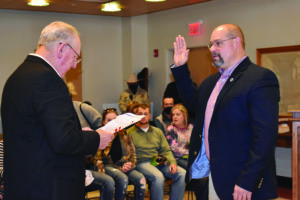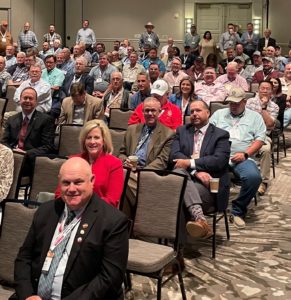Congratulations to our 79 newly elected County Judges and 172 newly elected County Commissioners!
County Progress Magazine recently asked Calhoun County Commissioner David Hall to reflect on his five-plus years in office.
“Being a County Commissioner is nothing like I’ve ever done before. It is a special calling that comes from the love one has for his/her  community and a passion to help and serve others,” Hall shared. “I feel that I am truly blessed to have had this opportunity and will continue to do my best as long as the community will allow me the privilege to serve.”
community and a passion to help and serve others,” Hall shared. “I feel that I am truly blessed to have had this opportunity and will continue to do my best as long as the community will allow me the privilege to serve.”
In the same article, available at http://ow.ly/gWWu50KJwb4, we asked Commissioner Hall to talk about the challenges of the job.
“My biggest challenge so far has been facing the aftermath of a Category 4 hurricane. During my first year in office, Hurricane Harvey hit Calhoun County and the surrounding counties causing many areas of damage in my precinct. Knowing that repairing all of the damage was beyond our means, I applied for and was successfully granted funds to help restore our small beach community. Little did I know those small grants provided the knowledge and experience that would be used towards larger grants.”
Finally, we asked Commissioner Hall if the job is what he expected.
“That is a difficult question. I’d have to say yes and no,” Hall concluded. “Even after having done a TON of research on the position, I find that after almost halfway through my second term, I have barely scratched the surface of what to expect. If I had to choose, I’d have to say it’s way more than I expected in a good way. It is the most rewarding position I’ve ever held.”
Veteran officials like Hall have talked about the learning curve they navigated during their first year on Commissioners Court. County Progress consulted with a group of these officials to develop the article below. In honor of both your new office and the New Year, we’ve presented this information as a set of “New Year’s County Resolutions.”
Fulfill My Mandated Duties
As a part of the State of Texas, the structures and duties of county government are set forth in the Texas Constitution. As an arm of the state, Texas counties can only do those actions that are specifically authorized by Texas law. Equally important, Texas counties must do those actions that are required by law.
As a unit of state government, county government responsibilities include:
- Conduct elections.
- Process and maintain voter registration.
- Provide for public safety.
- Maintain and operate the court and jail system including provision for indigent legal defense.
- Provide medical care for indigent county citizens.
- Facilitate the issuance and recording of public documents.
- Process motor vehicle registration and title transfers.
- Collect and remit state motor vehicle taxes.
- Provide local support for state agencies such as the Texas Department of State Health Services, the Department of Public Safety, the Texas Parks & Wildlife Department, and the Alcoholic Beverage Commission.
During a conference presentation on the roles and responsibilities of the County Commissioner, longtime Bell County Commissioner Tim Brown highlighted the complex nature of the job.
- Commissioners Courts do not live in a democracy. Rather, county government is actually an agency of the state, and everything Commissioners Courts do is rooted in state law.
- A college professor could attempt to teach a college class on the applicable body of law and not completely cover it. In addition, these laws pertaining to the Commissioners Court’s authority can be redundant and confusing.
- The Commissioners Court is the governing body of a county, similar to the chief executive officer of a corporation, addressing fiscal policy, compliance, and enforcement, a “complicated group of responsibilities.”
As part of his training course, Brown, now retired, provided attendees with a compilation of statutes summarizing the general responsibilities and statutory authorizations for each function of the Commissioners Court. The document cited hundreds of statutes authorized by the following:
- Agriculture Code
- Civil Practice and Remedies Code
- Code of Criminal Procedure
- Education Code
- Election Code
- Government Code
- Health and Safety Code
- Human Resources Code
- Labor Code
- Local Government Code
- Natural Resources Code
- Occupations Code
- Parks and Wildlife Code
- Property Code
- Tax Code
- Texas Constitution
- Texas Family Code
- Transportation Code
- Utilities Code
- Vernon’s Revised Civil Statutes
- Water Code
The Texas Legislature meets every other year and makes hundreds of changes to many of these statutes, meaning officials need to keep apprised of evolving laws. Thankfully, the County Judges and Commissioners Association of Texas (CJCAT) has an established legislative program to help keep Commissioners Court members informed.
Set Discretionary Goals
As a unit of local government, the Commissioners Courts of Texas are often described as “grassroots government,” and County Judges and Commissioners are oft portrayed as “those closest to the people” who live and work where “the rubber meets the road.”
In his presentation titled County Expenditures and Services, former Denton County Auditor James Wells wrote, “…Texas counties have long operated under the idea that their primary purpose is to provide services to the citizens. All actions of county government and all expenditures of county funds are connected to the goal of providing services to the citizens.” In the majority of Texas counties this means going beyond the mandatory services and expanding into “discretionary” services, such as parks, community centers, libraries, senior centers, and emergency medical and family services – those special functions that enhance the quality of individual lives and the community as a whole.
Texas county roads are a common topic of discussion when it comes to county services. The Texas Constitution and statutes assign roads as a county responsibility, confirmed Jim Allison, CJCAT senior general counsel. However, the funding level is discretionary with the Commissioners Court.
When Franklin County Commissioner Larkin Jumper took office in 2015, he set a personal goal to learn all he could about road and bridge maintenance.
“My background was financial, not construction,” explained Jumper, who retired last month. “I determined which Commissioners had the better roads, and then I sought their advice. I then developed both an annual and a multiyear work plan to rebuild our precinct roads.”
What goals and priorities will you set for your county?
Conduct Effective Meetings
Issues such as community services and infrastructure needs are addressed at meetings of the Commissioners Court.
No legal requirement obligates Commissioners Court meetings to be conducted under a formal parliamentary procedure. According to Attorney General Opinion DM-228: “A Commissioners Court may adopt reasonable rules that are consistent with relevant provisions of law to govern the conduct of its meetings. If the court wishes to use Robert’s Rules of Order or some other formal rules, the method chosen must be consistent with law, adopted by a majority vote of the court, and applied to all court members.”
The Opinion refers to Sections 81.005 and 81.006 of the Local Government Code, which address the time, location, and quorum requirements of Commissioners Court meetings.
In addition, the Opinion states: “The court is also subject to the Open Meetings Act, but we have found no statute setting out comprehensive procedures for the conduct of Commissioners Court meetings.”
Many counties have decided that it is in their best interest to formally adopt rules of procedure, conduct, and decorum for meetings of the Commissioners Court. These areas, along with topics such as public participation and the meeting agenda, are addressed in a sample set of rules developed by Allison. These sample rules have been updated to reflect the latest legislative changes on the County Progress website at https://bit.ly/2VYpIIN.
House Bill 2840 passed by the 86th Texas Legislature amended the law relating to the right of a member of the public to address the governing body of a political subdivision at an open meeting of the body. The law states:
- Members of the public will be entitled to address all open meetings, not just public hearings.
- The Commissioners Court may continue to limit the amount of time allotted to the public and may continue to punish disruption of the meeting.
“Rules of procedure and decorum are very important for an efficient, productive Commissioners Court meeting,” Allison stated. “The rules provide a framework for the transaction of business and inform the public on the proper procedure for presenting comments at the meeting.”
Pursue My Continuing Education
The Texas Constitution spells out the education requirements for members of Commissioners Court. What better time than now to set your educational calendar? 
Per Government Code Section 74.025, County Judges are required to earn 30 credit hours during their first year of office, and 16 credit hours for each 12-month reporting period following the first year in office. For additional information, including exemptions, see http://www.txcourts.gov/organizations/bar-education/judicial-education.aspx.
Per Local Government Code Section 81.0025, County Commissioners must earn 16 hours for each 12-month period in office; eight surplus hours may be carried from one 12-month period to the next. (See Key Concept, page 10, for additional statutory information.)
The County Judges and Commissioners Association of Texas is committed to providing a variety of educational opportunities, per Article II, Section 4 of the CJCAT Constitution: “This Association shall sponsor and co-sponsor educational conferences, seminars, and other programs for county officials and county employees to study information relative to county affairs and assist those officials in need of Continuing Education credits, as required by law.”
“Education is ever-changing,” shared CJCAT Immediate Past President Rick Bailey, Johnson County Commissioner. “Stay educated, and you will be effective.”
Planning is well underway for the 2023 CJCAT regional and state conferences, with specific details available in our County Calendar located on page 53 of this issue.
Go Above and Beyond – Pursue Commissioners Court Advanced Curriculum Certification
Earning your Commissioners Court Advanced Curriculum certification is a worthy resolution that has already been achieved by more than 700 officials.
Commissioners Court Advanced Curriculum (CCAC) is a comprehensive educational program designed specifically for members of the Commissioners Court.
 CCAC was adopted by the County Judges and Commissioners Association of Texas in 1992 to provide curriculum for an advanced study in county government. The program is continually updated as foundational information provided in the original program is merged with material necessitated by legislative changes and the new and varied challenges faced by a rapidly growing state.
CCAC was adopted by the County Judges and Commissioners Association of Texas in 1992 to provide curriculum for an advanced study in county government. The program is continually updated as foundational information provided in the original program is merged with material necessitated by legislative changes and the new and varied challenges faced by a rapidly growing state.
The development of CCAC is a combined effort of the CJCAT, the V.G. Young Institute of County Government, a part of Texas A&M AgriLife Extension Service, and the Texas Association of Counties.
“The Commissioners Court Advanced Curriculum Program offers County Judges and Commissioners advanced training beyond the state mandated educational requirements,” explained Hays County Commissioner Debbie Gonzales Ingalsbe, chairman of the CJCAT County Commissioners Education Committee. “The program helps us gain a greater understanding of every elected office, including duties and responsibilities, which equips us to provide the needed resources for services that benefit our county residents.”
CCAC provides a comprehensive course of study as follows:
- Phase I Orientation – 16 hours-plus
- Phase II Basics – 16 hours
- Phase III Advanced Instruction – 32 hours
Phase I Orientation courses currently are offered at the Seminar for Newly Elected County Judges and Commissioners, which is conducted every January following an election year. Attendance at this seminar has traditionally been limited and restricted to new Judges and Commissioners. Since it is not feasible to require County Judges and Commissioners to retroactively attend the orientation seminar, County Judges and Commissioners who assumed office prior to Jan. 1, 1995, are permitted to substitute 16 hours of other approved instruction for the orientation course.
Phase II County Government Basics includes instruction concerning the duties and responsibilities of all county officers and departments. Phase III includes advanced instruction in the functions of county government. These courses are offered at the annual County Judges and Commissioners Association of Texas regional and state conferences and the annual V.G. Young Institute of County Government School for County Commissioners Courts.
Offer to Serve My Association
Every Texas county is a member of the County Judges and Commissioners Association of Texas.
The CJCAT is divided into three regional associations with several subgroups within the regional organizations.
- The North & East Texas County Judges and Commissioners Association is comprised of 74 counties.
- The South Texas County Judges and Commissioners Association includes 63 counties. (Chambers County is a member of both the North & East and South associations.)
- The West Texas County Judges and Commissioners Association serves 118 counties.
- The Deep East Texas County Commissioners and County Judges Association is a subgroup of North & East Texas, made up of 15 counties from Far East Texas.
- On the opposite side of the state, the Far West Texas County Judges and Commissioners Association represents the western-most counties, with a total membership of 36.
- Also a part of the West Texas group, the Panhandle County Judges and Commissioners Association includes 34 member counties.
Each Association, from the State Association down to the subregions, has elected officers. Most have committees that conduct important Association business, including the development and presentation of resolutions, discussion of conference sites, nomination of future officers, and selection of scholarship recipients. Your latest State Association Resolutions are presented in this issue on Page ?.
The County Progress Magazine staff attends your Association conferences. We look forward to meeting you! If you have any questions about your Association, upcoming conferences, or resources for county officials, please contact Editor Julie Anderson at janderson@zacpubs.com.















